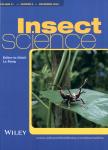Genitalia-associated microbes in insects
Genitalia-associated microbes in insects作者机构:Animal Population Ecology Animal Ecology I Bayreuth Center of Ecology and Environmental Research (BayCEER) University of Bayreuth Universitatsstrasse 30 95440 Bayreuth Germany
出 版 物:《Insect Science》 (昆虫科学(英文版))
年 卷 期:2015年第22卷第3期
页 面:325-339页
核心收录:
学科分类:083002[工学-环境工程] 0830[工学-环境科学与工程(可授工学、理学、农学学位)] 0905[农学-畜牧学] 08[工学] 09[农学]
主 题:genital microbiome interactions sexually transmitted microbes spermmicrobe
摘 要:In sexual reproduction different types of symbiotic relationships between insects and microbes have become established. For example, some bacteria have evolved almost exclusive vertical transmission and even define the compatibility of insect mating partners. Many strictly sexually transmitted diseases have also been described in insects. Apart from such rather specific relationships the role of opportunistic infections in the reproductive process has been widely neglected. Opportunistic microbes transmitted passively during mating might impose an energetic cost, as the immune system will need to be alert and will use resources to fight potential intruders. Through mating wounds and contaminated reproductive organs opportunistic microbes might be transferred to mating partners and even enter the body cavity. Females as the "receiving" sex are particularly likely to have evolved adaptations to avoid or reduce opportunistic infections. Males of several species show highly complex seminal fluids, which as well as containing components that influence a males' fertilization success, also possess antimicrobial substances. The role of antimicrobials in the reproductive process is not well understood. Some evidence hints at the protection of sperm against microbes, indicating a role for natural selection in shaping the evolution of reproductive traits. By highlighting the potential importance of microbes in sexual selection and their role in reproduction in general I will make a case for studies in sexual selection, especially the ones investigating postcopulatory processes, that should incorporate environmental, as well as genotypic variation, in reproductive traits.



